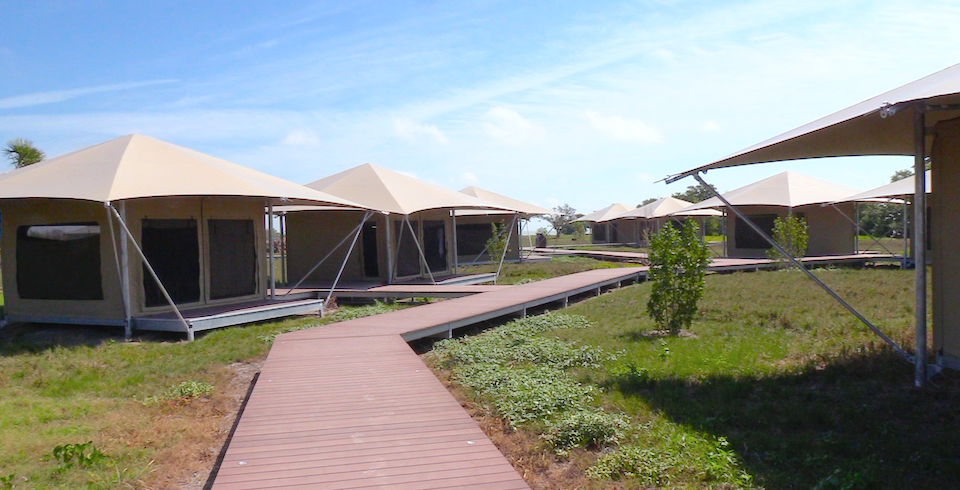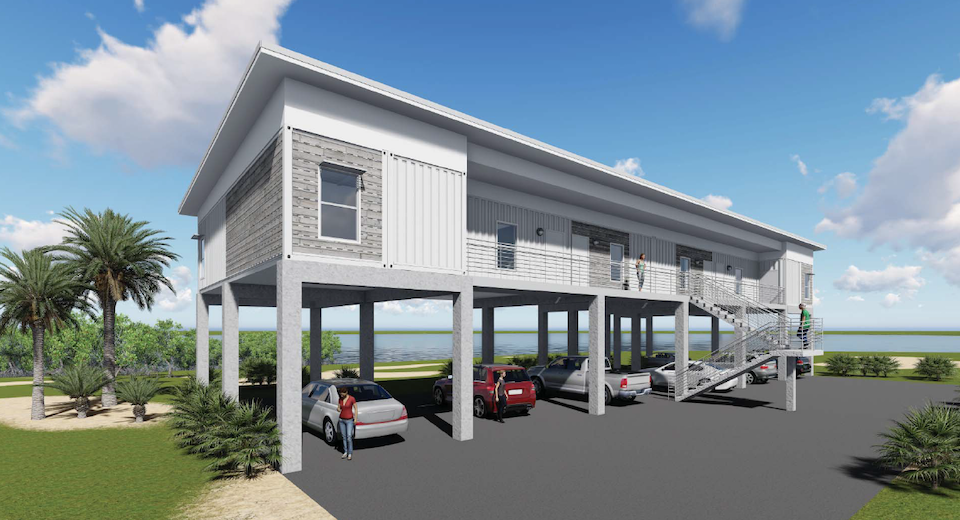
Twenty "eco-tents" are the first phase in expanded lodging at Flamingo in Everglades National Park/Kurt Repanshek
Smudge pots weren't in sight when I visited Flamingo on the southern tip of Everglades National Park, but it was early spring and the mosquitoes hadn't quite worked themselves up to scourge strength. They are legendary when in full biting force, with rumors of cows and mules being killed by vicious, insatiable swarms of the bloodsuckers. And yet, the appeal of Flamingo to anglers and those fleeing winter's cold for a few days make it a popular destination.
To Everglades Superintendent Pedro Ramos, Flamingo can be a world-class destination once suitable lodging is available, and that lodging slowly is returning.
There had been lodging in the not-too-distant past at Flamingo, an ironically named place in that there really are few if any flamingos to be seen here. As the story goes, when a post office was built here in 1893 the few year-round locals thought "Flamingo" sounded better than "End of the World." Flamingos had been in the habit of wintering in the area back in the 1800s, but they seldom are seen there these days.
Though not at the end of the world, Flamingo can be viewed as being at the end of the park, lying 38 miles south of Homestead where the "Flamingo Lodge Highway" ends. While many fishers continue to be drawn to Flamingo, and the occasional tourist interested in a boat ride down the Buttonwood Canal, the loss of the Flamingo Lodge in 2005 after it was trashed by back-to-back hurricanes negated a trip to the place for many. But a reason to visit for more than a day just might be coming back.
Three years ago Guest Services, Inc., a large concessionaire with operations in Mount Rainier National Park, North Cascades National Park, Lake Roosevelt National Recreation Area, and the National Mall and Memorial Park, signed a contract with the National Park Service to return lodging to Flamingo. The plan is to build 24 cottages and 20 eco-tents, initially, with the option of expanding that to 40 cottages and 40 eco-tents.
While the concessionaire didn't meet the December 2019 timeline for having the cottages in place, it was able to install the 20 tent cabins. Clustered along a boardwalk in a meadow adjacent to the Flamingo Campground, the tents are airy, outfitted with either two double beds or a single queen bed, equipped with netting to allow one to escape any mosquito that doesn't slip inside with you, come with a fan to move the air around a bit, and provide sweeping views of Florida Bay a few steps away, if not right from your bed.

Sunrises at Flamingo can be unforgettable/NPS file
"You just sit right here, you watch the sun rise over here in the east, and the sun comes right across and it sets right over here in the west. It's absolutely spectacular,'' J.J. Condella, the concessionaire's general manager at Flamingo, told me as we sat in one of the tents. "You don't even have to leave the tent. It's pretty amazing."
The tents opened to the public last October, near the end of the hurricane season that typically runs from June 1 to November 1, and occupancy "has been quite high," said Condella. "They're well received by anyone who stays in them at the moment."
Amenities, however, are few for the moment. The boardwalks lead you to a small restroom and shower house (where the sun heats the water), and to a few picnic tables and fire ring. When I visited in March, the site for the 20 cottages was graded and utilities were beginning to be installed. Perhaps due to that Spartan experience, most tent rentals were for just a night, said Condella.
The tents are available year-round. During the hot, humid summer months, the beds and most of the furnishings are removed -- "That's just for hurricane preparedness," the GM said -- and the tents are made available to campers who can sleep on the floor.
"Should a hurricane be coming, everything has to come out, and that's a very lengthy and timely process," Condella explained. "It's very labor intensive. So we're going to get ahead of that, and we're going to rent these out as a very basic structure. We'll have the walls here, the frame in place, we'll leave a fan and a lantern, and then you can bring your own air mattress and sleeping system. That way you don't have to fight the bugs or the heat or set up your own tent."
The Park Service, following the loss of the Flamingo Lodge, was interested in the "eco-tent" approach to lodging because of the hurricanes that can rake Florida. According to the Hurricane Research Division of the National Oceanic and Atmospheric Administration, 40 percent of all U.S. hurricanes hit the Sunshine State, and 85 percent of major hurricanes have either hit Florida or Texas. Between 1851 and 2015, of the 290 hurricanes that have come ashore between Texas and Maine, 114 have hit Florida, the division notes. Thirty-seven of those 114 have been "major" hurricanes.
The tent systems that Guest Services went with are designed to stand up to a Category 4 hurricane, said Condella. Time will tell, as the "plan is to leave the structures in place, with the canvas and the framing," he said.
While climate change raises the question of how Flamingo will fare with sea level rise -- 2017 studies said the housing areas and visitor center at Flamingo would stay above sea level rise until 2100 at the low end of predictions, while they could be partially inundated by 2050 at the high end -- park officials say that issue is not being overlooked with the planning for Flamingo.
"We're definitely building with resiliency in mind. We acknowledge that climate change is happening here, we're at sea level," Everglades spokesperson Allyson Gantt told me. "We're really preparing for storm surges, we get those nearly every year, and certainly with hurricanes. Flamingo has a history of that, and we're expecting that. That's one of the reasons why we're elevating everything."
The cottages, for instance, will be 20-22 above ground on concrete pillars, she said. "They're going to be steel container boxes, essentially, up on stilts, concrete pillars, so we expect those to hold up pretty well," Gantt said.

Repurposed shipping containers are to be used to build elevated cottages at Flamingo/Gates, Inc. artist's rendering
"We expect to be able to get 40 or 50 years out of these facilities," she went on. "We're taking that (sea level rise) into account, but 40 or 50 years of allowing people to enjoy their national park, educate people about the ecosystem and the resource, we think that's a worthy investment."
Condella agrees with Ramos that Flamingo will become a world-famous destination, and that's what interested Guest Services in bidding for the contract. The marina long has been in place for fishers, and additional infrastructure is on the way.
"We're going to be adding a restaurant and 24 cottages, which we've already started the site work on that," with the units expected to be ready for rental by late 2021 or early 2022, he said. A "quick, casual restaurant" where you place your order at the counter should be in place by then as well.
"It'll be breakfast, lunch and dinner. It's going to be a welcome amenity here at Flamingo. It's one of the things that's lacking," said Condella.
Along with the return of lodging at Flamingo, there is an ongoing revitalization of the Flamingo Visitor Center, a Mission 66 project undergoing a complete renovation with an eye on reopening in 2021. Although it had weathered numerous storms over the decades, Hurricanes Wilma and Katrina in 2005 (which destroyed the Flamingo Lodge) and Hurricane Irma in 2017 were particularly damaging to the visitor center. In 2016, the national park and the South Florida National Parks Trust won a $250,000 historic preservation grant to restore the visitor center, which has been bolstered with other public and private funding.
"Our 75th anniversary is in 2022, and we're planning to have Flamingo completely revitalized by then," said Gantt as we stood on the visitor center's breezeway overlooking Florida Bay, where the occasional manatee surfaced for a snort of air. "It will be sort of a rebirth of a really popular destination in the park. It's the end of the road, it's the gateway to Florida Bay. People have been coming for decades and enjoying this place. And we want to bring it back, we want to raise it to the level of what people expect when they come to a world-class national park.
"So not only are we restoring the Everglades on the ecosystem side, but we're really trying to bring back the visitor experience."
Traveler footnote: Rates for the eco-tents at Flamingo vary with the season, ranging from $50-$150 a night. Pricing for the cottages has not yet been set. For information, visit this website.


 Support Essential Coverage of Essential Places
Support Essential Coverage of Essential Places







Comments
My family and I were at the Flamingo park this past weekend and was told we could have NO music, even though it wasn't listed in the rules. Someone complained about our grpup because we are African americans. They sent security and a few minutes later the police arrived. We will NEVER camp at Flamingo again. We were also told we had to have only 4 tents. Right next to us a group of Caucasians were camping with 11 tents and were VERY LOU!!
I'm happy that they're going to have lodging again at flamingo I just bought a new boat and I can't wait to go fishing ! ! !
Kathy --- it has been several months since your February 14th post, and I hope that you filed your complaint with either park managment or - better - with the regional office of the NPS. There should be no place at an NPS facility for that sort of experience.